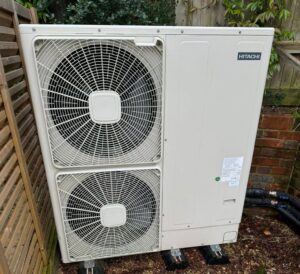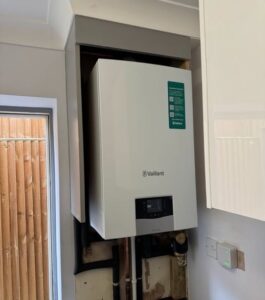Heat pump or boiler? With government plans to reach net zero by 2050, heat pumps are fast becoming a popular and more sustainable alternative to traditional boilers.
Renewable energy systems such as heat pumps have been prioritised in new builds from this year onwards, but how do these systems compare, and which one is right for your home?
Let’s break it down.
What are heat pumps?
A heat pump, while running on electricity, extracts heat from renewable energy sources such as the air, ground and water. It then provides hot water to homes, as well as heat to radiators and underfloor heating.
There are multiple types of heat pumps and each utilise different renewable energy sources. For instance, an air source heat pump gathers energy from the air, and these are attached to the side of homes. Whereas a ground source heat pump is placed underground in areas such as gardens so that it can effectively utilise energy from the ground.

Types of heat pumps
There are three types of heat pumps available on the market:
- Air source heat pump: Extracts heat from the outside air even in cold weather. This is the most common type as it doesn’t require a garden or land space, making It more accessible than other types.
- Ground source heat pump: Uses buried pipes to harness heat from the ground, which maintains a stable temperature all year. Highly efficient, but installation is more complex.
- Water source heat pump: Draws heat from a nearby body of water, like a river, lake, or well. Very efficient but installation is dependent on access to a water source.
The heat pump you choose will depend on the amount of space and type of renewable resource you have access to. Air source heat pumps are the most commonly used type in homes, and thanks to recent changes to planning permission even more homeowners across the UK can benefit from one.
What are the pros and cons of heat pumps?
There are both upsides and downsides to heat pumps, but as we move towards a greener future it is important that homeowners have the full picture before making a decision to move from a gas boiler.
Heat pump pros
What are the advantages of heat pumps?
- High efficiency: They are three times more efficient than boilers.
- Low carbon emissions: When powered by renewable electricity, there can be carbon savings of up to 70% compared to a gas boiler.
- Running cost savings: Overall there are long-term savings depending on tariffs and insulation.
- Heating and cooling: Some systems can also cool your home in summer.
- Grants: Government grants and schemes can offset installation costs like the Boiler Upgrade Scheme.
- Low maintenance: Fewer moving parts and no combustion means fewer breakdowns. Many heat pumps will also have remote access so that installers can check for issues before coming to fix the system.
Heat pump cons
What are the disadvantages of heat pumps?
- High upfront cost: It can be a high cost upfront depending on the type of heat pump and installation. (This can be subsidised by government grants.)
- Lower heat output: They work best with underfloor heating or large radiators, and may not feel as “instant” as a gas boiler.
- Space requirements: Air source heat pumps require room outdoors and ground source need underground space.
- May need electrical upgrades: Older homes may need fuse board or wiring improvements to meet heat pump requirements. Which can increase costs and installation time.
What is a boiler?
A boiler is a heating system that either uses gas, oil or electric in order to heat water within homes. And 23 million UK homeowners use one to provide central heating, and supply their homes with hot water.
The three types of boilers
There is more than one type of boiler available on the market:
- Combi or combination boiler: This is the most compact option, generating heat from one single unit. It heats water on demand, and there is no storage tank needed.
- Regular or conventional boiler: This type of boiler has a water tank and heats up radiators directly. They have a cylinder to provide hot water as well as a cold-water tank.
- System boiler: Like a conventional boiler, system boilers also have a hot water storage cylinder but no cold-water tank. They can be thought of as an upgraded version of a conventional boiler.
What are the pros and cons of boilers?
As a traditional method of heating homes, boilers have several pros and cons for homeowners to keep in mind.
Pros
What are the advantages of boilers?
- Efficient heating: Modern gas boilers are very efficient (up to 90%+), especially condensing models.
- Fast and reliable: Provides hot water and heating quickly. Reliable, familiar systems with plenty of service options.
- Lower fuel cost: Gas is often cheaper than electricity or oil in many regions.
- Compact: Combi boilers save space by eliminating the need for tanks.
Cons
What are the disadvantages of boilers?
- Fossil fuel use: Burns natural gas, a non-renewable resource, contributing to CO₂
- Installation cost: Initial installation (especially for new systems) can be expensive. And extra fees for breakdowns.
- Gas supply required: Not suitable for off-grid homes without access to mains gas.
- Maintenance needed: Requires regular boiler servicing for safety and efficiency.
- Regulatory pressure: Gas boilers are being phased out in new builds in the UK from 2025.
Heat pump vs boiler: Should you make the switch?
Should you make the switch from a boiler to a heat pump? According to Which?, boilers that are ‘A-rated’ can be over 90% efficient, but heat pumps have capabilities that mean they can reach 200-400% efficiency.
If you’re eco-conscious and want lower carbon emissions, you may want to opt for a heat pump. They’re three times more efficient than boilers, and they’re a way for homeowners to future proof their properties. And thanks to the government grants, you can even get money towards installation costs too.
Interested in making the switch to an air source heat pump? Or maybe you need your boiler servicing to ensure optimal performance? Either way, contact our team today.


